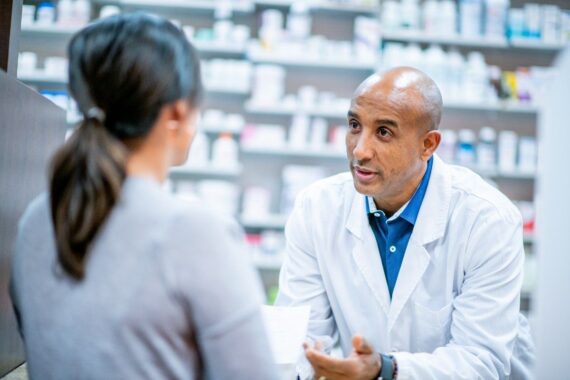Only 8% of patients using the Pharmacy First service are referred back to their GP practice, NHS England has claimed.
Under the service, GP practices can refer patients to community pharmacies for seven common conditions – including sore throats and ear infections – in a bid to ‘save up to 10 million general practice team appointments a year’.
According to data shared by NHS England during a webinar for GPs, 1.8 million Pharmacy First consultations were completed between the launch of the service in January and the end of June.
Earlier this year, a number of GPs told Pulse that there were concerns around the efficiency of the scheme, with some pharmacies reportedly directing patients back to general practice for a variety of reasons, including lack of equipment or staff.
And GPs attending the NHS England webinar asked for clarification on how many patients are being sent back to general practice from the service.
In response, NHS England said: ‘Pharmacists are required to provide details to the practice if they assess the patient and then decide a referral to a GP is required. The referral rate back to GP is at 8%.’
Professor Azeem Majeed, a GP and head of the primary care department at Imperial College London, told Pulse that this percentage indicates formal referrals made by pharmacists back to general practice, but it does not take into account instances where patients seek additional medical advice from a GP after a Pharmacy First consultation.
He said: ‘The 8% referral rate appears plausible, considering the Pharmacy First scheme was designed to handle straightforward cases within the pharmacy setting.
‘Pharmacists are trained to manage specific conditions and refer patients to GPs only when necessary.
‘However, this statistic reflects formal referrals initiated by pharmacists. It does not account for patients who, after a pharmacy consultation, independently choose to consult their GP for a second opinion or further evaluation.
‘Therefore, while the reported referral rate provides insight into the scheme’s effectiveness, it may not fully capture all instances where patients seek additional medical advice from a GP.’
NHS England’s new Pharmacy First data also showed that:
- 96% of pharmacies are currently registered for Pharmacy First
- 87% of registered pharmacies are ‘actively delivering’ the service
- 92% are signed up to provide the blood pressure check service and 77% to the pharmacy contraception service
- Around 7,300 pharmacies (69%) are signed up to all three services
DAUK GP spokesperson Dr Steve Taylor told Pulse: ‘1.8 million appointments sounds like a lot over six months but that is under 10,000 a day compared with 1.4 million in general practice.
‘It also is far short of the 10 million appointments projected as being saved. As NHS England have stated at the board meeting in July there is little evidence that it has impacted GP services and improved access for patients. It would be great to see the official figures on referrals back to GP and what is actually being treated.’
Dr Emma Nash, a GP in Hampshire, said that the service is not consistent in her area. She told Pulse: ‘We have a pharmacist who is a prescribing pharmacist beyond the PGD – so little comes back.
‘We’ve given up with any other pharmacies as they reject a lot with capacity of one or two per day and bounce back with a low threshold.’
Under the scheme, community pharmacies are allowed to supply antibiotics, which led GPs to raise concerns surrounding antibiotic stewardship, however NHS England has said it will monitor the service for any impact on antimicrobial resistance.
Pallavi Dawda, head of clinical strategy for community pharmacy at NHS England, reassured GPs on this issue again during the webinar.
She said: ‘We take the risk of AMR very seriously, and we are reviewing the data as it comes in from consultations, so that we make sure that we can put appropriate AMR mitigations into place should we have any concern.
‘The clinical pathways all adhered to NICE guidelines, as well as oversight from the NHS England AMR programme board that’s chaired by our national medical director, and it has also been overseen by our chief medical officer for England as well.
‘We’re really pleased that over 96% of pharmacies have registered to deliver the service, and 87% of those are actually delivering it month in, month out.
‘So if you as a GP practice are not sure which pharmacies are delivering the service, you will see that most of the pharmacies around you will actively be delivering it.’
Earlier this year, a group of influential MPs warned that Pharmacy First ‘will fail’ if patients ‘keep having to return to their GPs’.
The seven common conditions covered by Pharmacy First
- sinusitis
- sore throat
- acute otitis media
- infected insect bite
- impetigo
- shingles
- uncomplicated urinary tract infections in women








